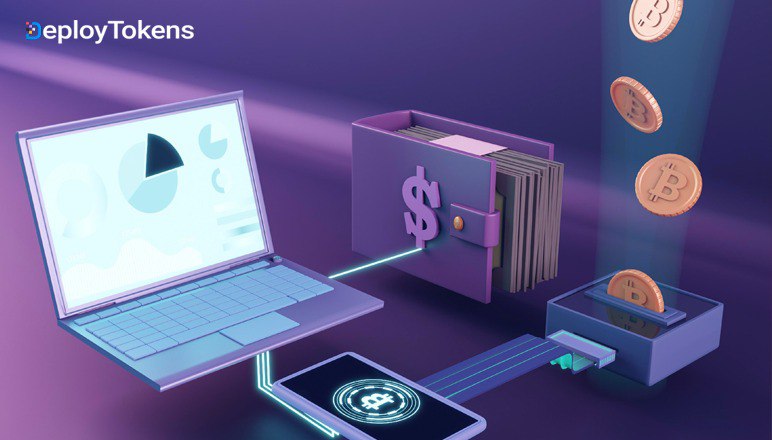If you manage a Web3 project, DAO, or token-based community, you know that sending tokens to multiple wallets one by one can be painfully slow and expensive. Whether it’s an airdrop, payroll, staking reward, or community payout, manual distribution is no longer practical. That’s where a multisender tool changes everything. It enables you to send tokens to hundreds or thousands of wallets at once, cutting costs, saving time, and minimizing risk.
In this complete Multisender Guide 2025, you’ll learn how bulk token transfers work, which tools are best, how to optimize gas fees, and why platforms like DeployTokens’ Multi Sender make the process seamless and secure.
What Is a Multisender Tool?
A multisender tool is a smart contract-powered platform that lets users send tokens to multiple wallets in one blockchain transaction. Instead of executing 1,000 individual transfers (and paying gas for each), you can batch them together into a single, efficient transaction.
This makes it ideal for:
-
Airdrops and giveaways
-
Payroll and community rewards
-
Staking and governance payouts
-
NFT or token distributions
DeployTokens’ Multi Sender allows you to upload wallet addresses, set token amounts, and distribute instantly across multiple EVM-compatible networks all without writing code.
Why Sending Tokens Manually Is Inefficient
Sending tokens one by one through MetaMask or a standard wallet is not scalable.
1. High Transaction Costs
Every transaction on blockchains like Ethereum incurs a gas fee. Sending 1,000 tokens individually could cost hundreds (or even thousands) in gas fees.
2. Increased Error Risk
Copy-pasting wallet addresses introduces human error. One wrong address can permanently lose tokens.
3. Poor Time Efficiency
Manual transfers are time-consuming and nearly impossible to track at scale.
By contrast, a multisender tool executes all transfers in a single, automated transaction—reducing gas usage and minimizing operational risk.
How Multisender Tools Work
Multisenders rely on smart contract batching to group multiple token transfers together.
The Core Mechanism
A single smart contract function handles an array of addresses and amounts:
This simple loop executes all transfers within one transaction—saving base gas fees and improving efficiency.
Gas Optimization Benefits
Batching amortizes the base 21,000 gas cost across all transfers. Sending 100 tokens in one batch can reduce total gas usage by over 70%, depending on the network.
Gas Efficiency and Blockchain Scaling in 2025
Gas costs vary widely between Layer 1 (like Ethereum) and Layer 2 (like Polygon, Base, or Arbitrum).

DeployTokens’ Multi Sender supports all these chains, letting you choose the most cost-efficient option for your project.
When choosing a multisender platform, consider security, chain support, and cost efficiency.
Why Choose DeployToken’s Multi Sender?
DeployTokens Multi Sender
-
No-code interface: Send to 100+ wallets in minutes.
-
Multi-chain support: Ethereum, Base, Polygon, Arbitrum, BNB Chain, and more.
-
Security: Audited smart contracts with on-chain verification.
-
Efficiency: Save up to 95% on gas fees via batch execution.
-
Transparency: Wallet-connected, non-custodial process.
Try it here: DeployTokens Multi Sender
How to Use DeployTokens’ Multi Sender
Follow these simple steps to send tokens to multiple wallets instantly:
-
Visit: DeployTokens Multi Sender
-
Connect your wallet (MetaMask, Coinbase, WalletConnect).
-
Select your network — Ethereum, Base, Polygon, or others.
-
Upload wallet addresses via copy the input into them.
-
Set token contract address and amount per wallet.
-
Confirm and send — your tokens are distributed in one transaction.
Pro Tip: Schedule transfers during off-peak hours (UTC 2–6 AM) to reduce gas costs by up to 50%.
Security and Optimization Best Practices
When using a multisender tool, follow these essential security measures:
1. Prevent Re-Entrancy Attacks
Follow the Checks-Effects-Interactions pattern in your smart contracts to update state before external calls.
2. Use EIP-712 for Secure Signatures
EIP-712 makes signed messages human-readable, protecting users from phishing or message replay attacks.
3. Manage Nonce and Deadlines
Include nonces and expiry timestamps to prevent replayed transactions.
4. Token Compatibility
Ensure compatibility with tokens that don’t strictly follow ERC-20 standards (e.g., BNB, OMG).
DeployTokens’ infrastructure already integrates these security patterns into every batch transaction.
Final Thoughts
Efficient, secure token distribution is fundamental to Web3 success. The multisender tool model reduces costs, improves scalability, and ensures transparent mass payouts.
Key Takeaways:
-
Batch sending reduces gas usage by up to 90%.
-
Layer 2 networks like Polygon and Base offer massive cost savings.
-
DeployTokens’ Multi Sender simplifies bulk transfers without coding.
-
Smart contract batching improves speed, reliability, and tracking.
Start your first batch transfer now: Use DeployTokens Multi Sender
FAQs
1. What is a multisender tool used for?
It lets users send tokens to multiple wallets in one blockchain transaction ideal for airdrops, rewards, and payouts.
2. Is DeployTokens’ Multi Sender secure?
Yes. It uses audited, on-chain smart contracts and never stores private keys.
3. Which chains are supported?
Ethereum, Base, Arbitrum, BNB Chain, Polygon, Avalanche, and more.
4. How many wallets can I send to at once?
Up to five hundreds (or thousands, depending on gas limits).
5. How much does it cost?
It depends on your chain’s gas fees but using L2 networks like Polygon can reduce the total cost to very cheapest.
